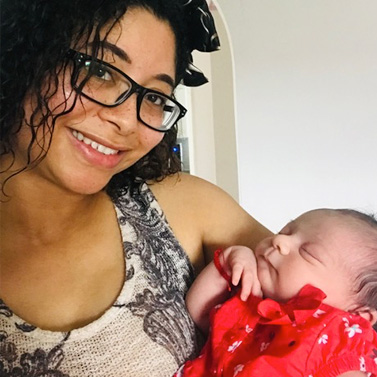Being a new parent changes your life in so many ways, especially when it comes to your sleep schedule. Our readers, veteran moms and dads who have been there and done that, shined a light on what you’re in for with your new bundle of joy.

Mo Mulla
Mo Mulla, Founder of Parental Questions.
Expect To Get Less Sleep
This is especially true in the early weeks and months after a baby is born. There are a few things new parents can do to make getting rest a little easier, such as establishing a bedtime routine and taking advantage of nap times. Ultimately, it takes time for both parents and baby to adjust to new sleeping patterns, so be patient and know that things will get easier in time.
Heightened Alertness, Frequent Waking will Impact Deep REM Sleep
In terms of sleep, new parents should expect to get about as much sleep as they did at a middle school slumber party: not much.
Between feedings, diaper changes, and consoling, there is not a lot of quality sleep to be had. One of the reasons we typically feel rested upon waking is because we’ve had a few cycles of deep REM sleep throughout the night. Most parents with a newborn, especially mothers, are naturally on high alert.
Even the slightest sound of the baby moving or breathing (or thinking you don’t hear them breathing) will wake most new parents throughout the night and prevent REM sleep from occurring. This is why you always hear people say, “Sleep when the baby sleeps,” because if you don’t, you aren’t very likely to get much sleep at all as a new parent.

Lauren Tingley
Lauren Tingley, Creator of Simply Well Balanced.

Lindsey Andrei
Lindsey Andrei is a mother of 2 young children and also a blogger at happymumzone.com where she writes about topics of early parenthood.
Exhaustion Is Normal
Newborns tend to wake around every 2-4 hours as their tummies are tiny and so they drink small amounts of colostrum or milk frequently. Babies at this age sleep a lot but they don’t yet have a routine so sleep times can vary from day to day.
New parents will experience some level of sleep deprivation. There will be times when you feel very tired as a new mom or dad but just remind yourself that the exhaustion from looking after a newborn won’t last forever. Eventually, babies should sleep for longer periods at a time.
My advice for managing the exhaustion is to rest whenever your baby sleeps to recharge your energy levels. Also, if family or friends offer help with errands and house chores then take up their offer.
Also, to help to soothe your baby ready for sleep, play sounds of a heartbeat as it reminds them of the womb. Skin-to-skin contact can also help to relax babies so you can give this a try when trying to calm your baby to sleep (just make sure they aren’t too cold and cover them with a blanket if needed).
4-5 Hours of Sleep at Night
A newborn will completely change your life, day and night. Every routine you have ever had will now be centered around a tiny baby and you will lose a lot of sleep.
Newborn babies need to be trained with a sleep schedule which takes a lot of effort and consistency from the parents. However, your baby will let you know when they need something at all hours of the night. It is important to get your baby on a sleep schedule that also includes frequent naps throughout the day, but not too many as they will not sleep through the night.
On average a new parent will only sleep between 4 and 5 hours of sleep a night, so it is important to try and make preparations before bed to help you get the most out of those minimal hours of rest. I suggest investing in a diffuser for some aromatherapy, minimizing the sounds around you, and ensuring your room is not too bright at night. Limiting time on your phone before bed is also helpful and will help you fall asleep much quicker.

Hassan Alnassir
Hassan Alnassir is the founder and owner of Premium Joy toy company.
Robin Young
Robin Young, Father of three sons and CEO of Fitness Savvy.
Teething, Sleep Training Also Will Keep You Up
When I became a dad for the first time, I realized I didn’t know what to expect in many areas. One surprise for me was, as the children got older, I realized that I got more sleep when the baby was a newborn.
Newborn babies sleep a lot, and you can catch some z’s when they’re napping, too, which is awesome. The real sleepless nights come as the baby gets older and starts to teeth. During these times, you can expect to be awake a lot during the night – and even if you get seven or eight hours of rest, it will usually be in chunks here and there with interruptions in between.
Then comes sleep training. This is a rough time. Your baby will cry for you, and the instinct is to go and pick the baby up. This is all fine and well when the baby is smaller, but as your child grows, this can then become a habit. This habit will mean that the child is not crying because he/she is hungry or dirty or ill, but because they want a cuddle.
This can cause lots of sleepless nights – especially if you decide to take the option where the child cries itself out and then falls asleep. Not only will you lose sleep, but emotionally this can hit hard.
If you would like one-on-one help for cultivating healthy sleeping habits in your infant or toddler, contact us at Tiny Transitions. We’ve helped thousands of families create sustainable sleep solutions and can do the same for you.
This is a crowdsourced article. Contributors are not necessarily affiliated with this website and their statements do not necessarily reflect the opinion of this website, other people, businesses, or other contributors.
